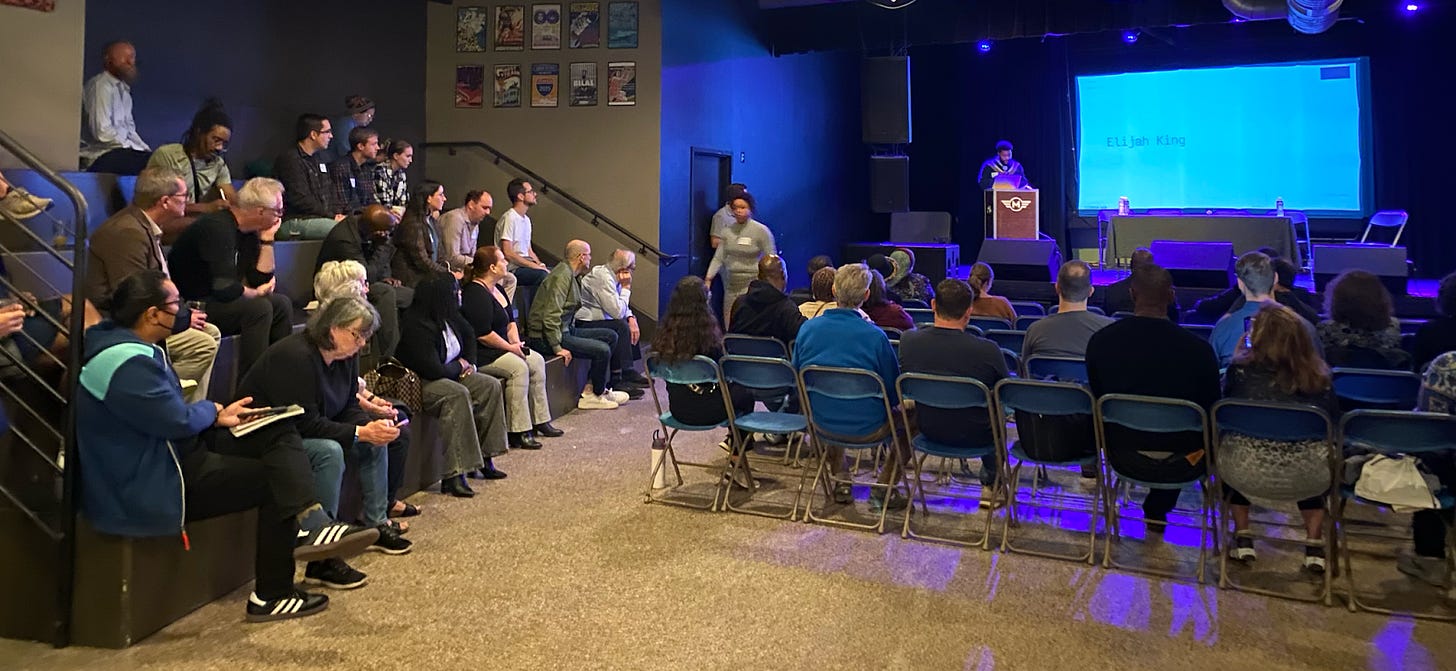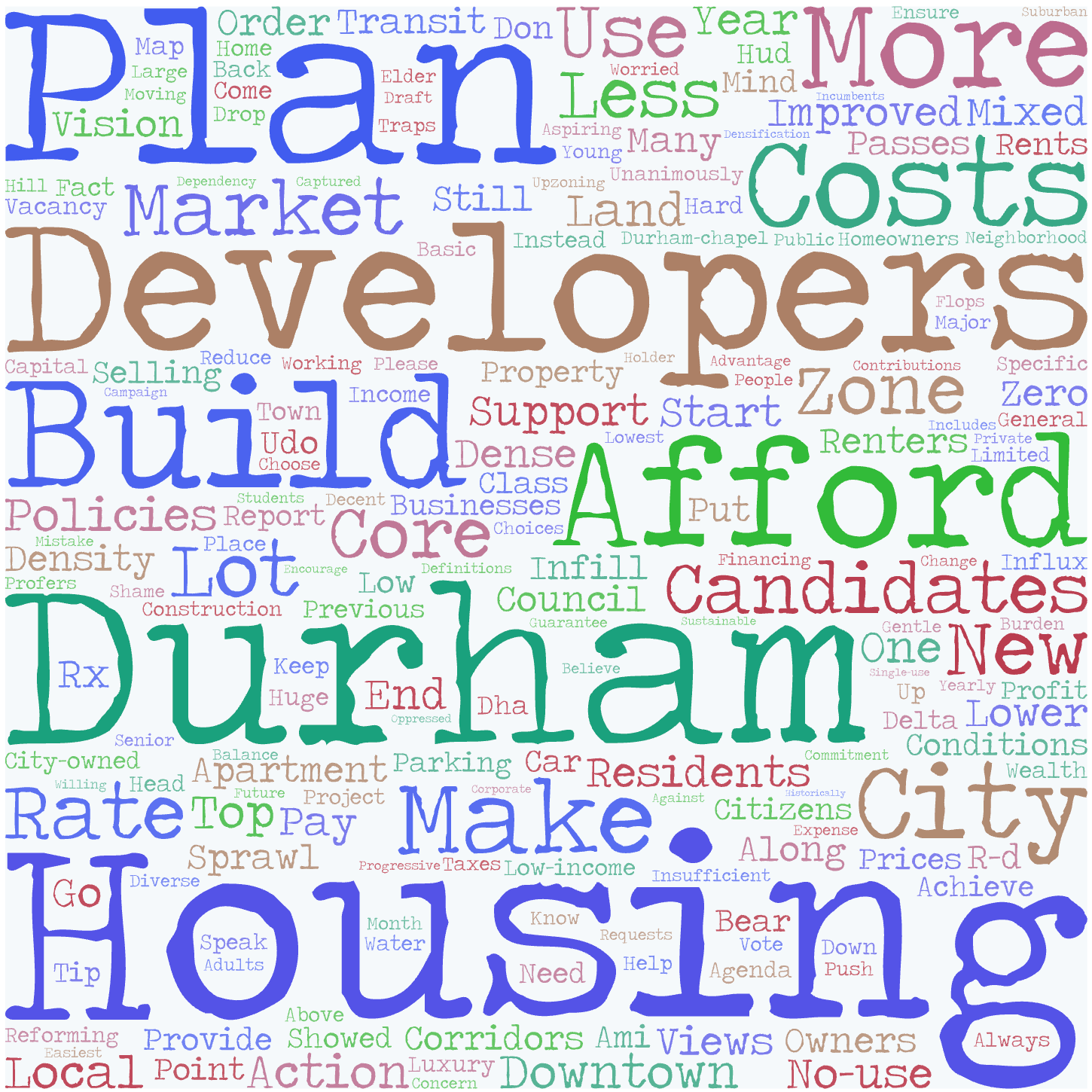On Tuesday night, something remarkable happened in Durham. For the first time, candidates for mayor and city council gathered on stage for an entire forum dedicated to one issue: housing. And the crowd showed up too: neighbors, builders, advocates, and families filled Motorco to talk about how Durham grows, who gets to live here, and what kind of city we’ll become.
CITYBUILDER organized this event because we believe housing isn’t just policy; it’s people. Every councilor vote, zoning case, ordinance, and plan affect our lives and our futures. Voters deserve leaders who are willing to talk about these decisions publicly.
We know first-hand that the people of Durham want to talk about housing.
This forum was just one night, but it’s part of a growing movement. In the past month, CITYBUILDERS’ readership and membership have surged, following tens of thousands of views of our candidate reports and the success of our forum at Motorco.
We opened the forum by naming what’s true: Durham was not built by one person or family alone, but by countless hands. Every era of Durham’s history has been shaped by people who worked, built, and stayed. And that’s how Durham’s future should continue to be constructed. That shared history grounded the night’s conversation, setting the stage for a forum where candidates and residents could talk about what it really means to build a city together.
Inside the Forum: The Candidates Who Came to Talk
The candidates who joined us were Leonardo Williams, Mark-Anthony Middleton, Matt Kopac, and Diana Medoff. They showed up, they listened, and they engaged with the community on one of Durham’s most pressing issues. This post includes short video clips from each of their remarks, so you can experience the highlights and energy of the evening.
Unfortunately, not every candidate attended.
Chelsea Cook, DeDreana Freeman, Shanetta Burris, and Anjanée Bell declined their invitations, some the morning of the event. All candidates were invited in August. All candidates attended another forum on Tuesday just prior to ours. Their absence demonstrates their ability to participate in open, public dialogue as part of their job. We are disappointed by those who chose not to attend, but this recap is about the ones who did.
The candidates who showed up chose dialogue over avoidance, and shared substance despite the noise. Thank you to the leaders willing to engage directly with the community to discuss housing for Durham.
But before we could hear from the candidates, our attendees had to walk through a protest of the forum.
As people arrived, a small group of protestors attempted to block the entrance to the event, and shouted at attendees and candidates through a bullhorn. They did not interrupt the forum once it began, but they did use their voices to intimidate those entering and leaving the building.
We believe passion is important in public debate. We welcome disagreement. We reject bullying. The best way to shape our future is not to shout down others, but rather to show up, listen, and build together.
Despite the intensity outside, what unfolded inside on stage was genuine civic conversation. The room overcame the initial tension and moved into dialogue as candidates shared how they see housing as part of Durham’s future. Below, you can watch highlights from those discussions and hear the voices of the leaders who showed up ready to engage.
Leo Williams
On why he’s unapologetically pro-housing, in the context of making Durham an inclusive community that’s focused on solutions.
…and on the historical status quo of zoning, which we’ve talked about before. He also mentions why zoning reforms (like SCAD and the new UDO) are so important.
Mark-Anthony Middleton
On why people are moving to Durham, and the real powers that Council has to manage growth.
Matt Kopac
On growing Durham in the midst of a housing shortage that affects both longstanding residents and the people moving here.
Diana Medoff
On why we need zoning changes, like Durham’s reforms that allowed faith-based institutions to build housing, in order to actually produce the infill that was agreed to in the Comprehensive Plan.
From the Audience
On Tuesday evening, attendees were invited to submit written questions for candidates to answer. While we didn’t have time to ask all of them, we’ve compiled the remaining audience questions and sent them to the candidates for their reference when they talk to voters. Here are the themes:
Affordable Housing & Equity: Many questions focus on how Durham can produce more affordable housing, who should pay for the gap between real construction costs and affordable prices, and how to ensure that Durham has housing for working-class, low-income, and young adult residents.
Land Use, Density, and Zoning Reform: Several questions revolve around upzoning, mixed-use development, and infill strategies to support housing supply and sustainable growth.
Development Economics & Public-Private Balance: There’s strong concern about how development is financed, whether local builders and developers are prioritized over corporate ones, and who bears the cost of affordability measures.
Transportation, Sustainability, and Urban Form: Some questions connect housing policy to car dependency, sprawl, transit, and climate-conscious planning.
Trust and Representation in Governance: A few questions touch on political accountability, equity, and representation, especially regarding who benefits from policies and campaign funding.
The Conversation Is Just Beginning
CITYBUILDER is a grassroots, member-based organization working for more housing choices and honest, transparent conversations about growth across the Triangle. We know that the people want to talk about housing.
We also need to talk about how we talk to each other. The politics of shouting and division might work on a national stage, but locally, they don’t serve anyone. What our communities deserve are leaders and neighbors who see each other as people first, not just as members of opposing political sides. If we can return to honest, human conversation, then we can build the kind of trust that makes progress possible.
What can you do?
Elections start now. Early voting began yesterday.
Durham’s future depends on the choices we make at the ballot box.
We’ve seen who shows up, who listens, and who leads with honesty.
Now it’s your turn.
Research candidates’ real positions, check out our report cards and read candidates’ full responses. Then make a plan and go vote.
But just as importantly, talk to your neighbors and friends about voting. If you need tips on how to start housing conversations, please join our Policy Talk next Tuesday.
Let’s keep building a Durham that welcomes new neighbors while strengthening the communities already here.
More homes. More neighbors. More voices at the table.



